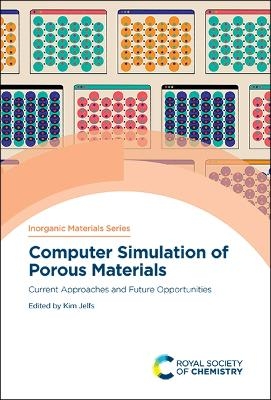
Computer Simulation of Porous Materials
Royal Society of Chemistry (Verlag)
978-1-78801-900-2 (ISBN)
Computer Simulation of Porous Materials covers the key approaches in the modelling of porous materials, with a focus on how these can be used for structure prediction and to either rationalise or predict a range of properties including sorption, diffusion, mechanical, spectroscopic and catalytic. The book covers the full breadth of (micro)porous materials, from inorganic (zeolites), to organic including porous polymers and porous molecular materials, and hybrid materials (metal-organic frameworks). Through chapters focusing on techniques for specific types of applications and properties, the book outlines the challenges and opportunities in applying approaches and methods to different classes of systems, including a discussion of high-throughput screening. There is a strong forward-looking focus, to identify where increased computer power or artificial intelligence techniques such as machine learning have the potential to open up new avenues of research. Edited by a world leader in the field, this title provides a valuable resource for not only computational researchers, but also gives an overview for experimental researchers. It is presented at a level accessible to advanced undergraduates, postgraduates and researchers wishing to learn more about the topic.
Dr. Kim Jelfs is a Senior Lecturer and Royal Society University Research Fellow (URF) in the Department of Chemistry at Imperial College London, UK. Her group specialises in the use of computer simulations to assist in the discovery of supramolecular materials. This includes the development of software to automate the assembly and testing of materials, with the application of artificial intelligence techniques including an evolutionary algorithm. The materials studied include porous materials for molecular separations or materials for the generation of renewable energy. Kim completed her PhD in Computational Chemistry at UCL (UK) in 2010, studying the crystal growth of zeolitic materials. She worked as a post-doctoral researcher conducting simulations across the experimental groups at the University of Liverpool, before beginning her independent research at Imperial College in 2013. She was awarded a 2018 Royal Society of Chemistry Harrison-Meldola Memorial Prize and holds an ERC Starting Grant.
Introduction to Computational Modelling of Microporous Materials;
Structure Prediction of Porous Materials;
Atomistic Simulations of Mechanical Properties;
Modelling Sorption and Diffusion Behaviour in Porous Solids;
Spectroscopic and Catalytic Properties;
Machine Learning in Porous Materials
| Erscheinungsdatum | 10.09.2021 |
|---|---|
| Reihe/Serie | Inorganic Materials Series ; Volume 8 |
| Verlagsort | Cambridge |
| Sprache | englisch |
| Maße | 156 x 234 mm |
| Gewicht | 640 g |
| Themenwelt | Mathematik / Informatik ► Informatik ► Theorie / Studium |
| Naturwissenschaften ► Chemie ► Anorganische Chemie | |
| Technik ► Maschinenbau | |
| ISBN-10 | 1-78801-900-8 / 1788019008 |
| ISBN-13 | 978-1-78801-900-2 / 9781788019002 |
| Zustand | Neuware |
| Informationen gemäß Produktsicherheitsverordnung (GPSR) | |
| Haben Sie eine Frage zum Produkt? |
aus dem Bereich


